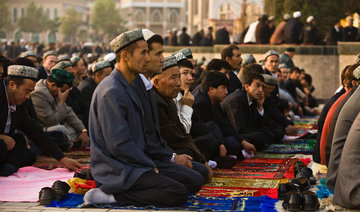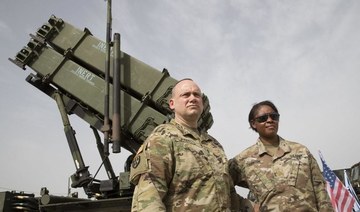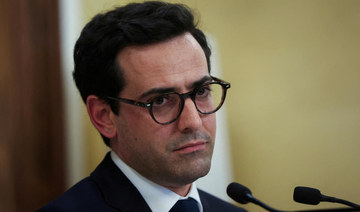BEIJING: Thousands of Muslims gathered at a mosque in northwestern China on Friday to protest its planned demolition in a rare, public pushback to the government's efforts to rewrite how religions are practiced in the country.
A large crowd of Hui people, a Muslim ethnic minority, began congregating at the towering Grand Mosque in the town of Weizhou on Thursday, local Hui residents told The Associated Press by phone.
"People are in a lot of pain," said Ma Sengming, a 72-year-old man who was at the protest from Thursday morning until Friday afternoon. "Many people were crying. We can't understand why this is happening."
Ma said the group shouted "Protect faith in China!" and "Love the country, love the faith!"
The protest comes as faith groups that were largely tolerated in the past have seen their freedoms shrink as the government seeks to "Sinicize" religions by making the faithful prioritize allegiance to the officially atheist ruling Communist Party. Islamic crescents and domes have been stripped from mosques, Christian churches have been shut down and Bibles seized, and Tibetan children have been moved from Buddhist temples to schools.
The residents of Weizhou were alarmed by news that the government was planning to demolish the mosque despite initially appearing to approve its construction, which was completed just last year.
The town's Communist Party secretary had even made a congratulatory speech at the site when the mosque's construction began, said Ma Zhiguo, a resident in his late 70s.
The authorities planned to take down eight out of the nine domes topping the mosque on the grounds that the structure was built larger than permitted, Ma said. But community members were standing their ground, he added.
"How could we allow them to tear down a mosque that is still in good condition?" he said, adding that the mosque conducts prayers attended by about 30,000 Muslims and was built using believers' personal funds. Photos online show the mosque to be a palatial white structure, with towering columns, vertical windows and a Chinese national flag erected out front.
Officials in the county and city propaganda offices said they were not aware of the situation. Other local authorities could not immediately be reached for comment.
In May, the county disciplinary inspection commission published a notice saying that Weizhou authorities had failed to properly oversee the construction of the Grand Mosque. As a result of lax supervision, the notice said, four mosques in the county had received a total of 1.07 million yuan ($156,148) in foreign donations. It did not specify whether the Grand Mosque was among the four.
Ma Sengming said protesters remained at the mosque through the night from Thursday to Friday and were twice visited by a local official who encouraged them to go home. Ma said the official did not make any specific promises, but tried to assure the protesters that the government would work with them on the matter.
More than a hundred police officers surrounded the mosque, but did not attempt to stop the protest, according to Ma.
Public demonstrations are rare in China, where the government is often quick to quash any hint of dissent. Under President Xi Jinping, the Communist Party is cracking down on religious expression and attacking what it calls radical ideas among the country's more than 20 million Muslims.
In the far west region of Xinjiang, following sporadic violent attacks by radical Muslim separatists, hundreds of thousands of members of the Uighur and Kazakh Muslim minorities have been arbitrarily detained in indoctrination camps where they are forced to denounce Islam and profess loyalty to the party.
Compared to those ethnic groups, the Hui are culturally much closer to China's Han majority, similar in appearance and speaking a variation of the mainstream Mandarin language.
But recently, reports said authorities have shut down Hui religious schools and Arabic classes and barred children from participating in Muslim activities.
James Leibold, a scholar of Chinese ethnic policies at Melbourne's La Trobe University, said the proposed demolition of the Weizhou mosque appeared to be part of a recent "far more assimilatory policy" toward ethnic minorities.
"The ultimate agenda is to erode minority identity and create a sense of belonging and connection to Chinese identity and Chinese culture," Leibold said.
Thousands in China mosque standoff over demolition plan
Thousands in China mosque standoff over demolition plan

- The move comes as China’s officially atheist ruling Communist Party is cracking down on religious expression
- The Hui are culturally much closer to China’s Han majority
Blinken urges Egypt to ensure aid is flowing into Gaza
“We do strongly urge our Egyptian partners to do everything that they can on their end of things to make sure that assistance is flowing“
WASHINGTON: US Secretary of State Antony Blinken on Wednesday urged Egypt to do everything it can to make sure humanitarian aid is flowing into Gaza as food and medicine bound for the strip piles up on the Egyptian side.
Blinken told a hearing in the House of Representatives that the Rafah crossing in southern Gaza remained closed after Israel’s military seized it on May 7.
Fighting near the crossing has made providing assistance challenging, but aid could still be getting through, Blinken said, an apparent reference to the Kerem Shalom crossing near Rafah that has been open.
“So we need to find a way to make sure that the assistance that would go through Rafah can get through safely, but we do strongly urge our Egyptian partners to do everything that they can on their end of things to make sure that assistance is flowing,” Blinken said.
Israel is retaliating against Hamas in Gaza — an enclave of 2.3 million people — over a brutal Oct. 7 attack by the Palestinian militants. Aid access into southern Gaza has been disrupted since Israel stepped up military operations in Rafah, a move that the UN says has forced 900,000 people to flee and has raised tensions with Egypt.
Egyptian security sources said Egypt cannot bring aid in through Rafah as this would mean an acceptance of the Israeli military’s presence at the crossing, which Egypt opposes.
Egypt’s foreign minister said on Monday that the Israeli military presence and combat operations put truck drivers in danger.
Israel’s strategic affairs minister, Ron Dermer, told MSNBC’s “Morning Joe” the hold-up was Egypt’s fault.
“Right now, Egypt is withholding 2,000 trucks of humanitarian assistance from going into Gaza because they have a political issue about the Rafah crossing,” Dermer said.
Nepal’s ‘Everest Man’ claims record 30th summit
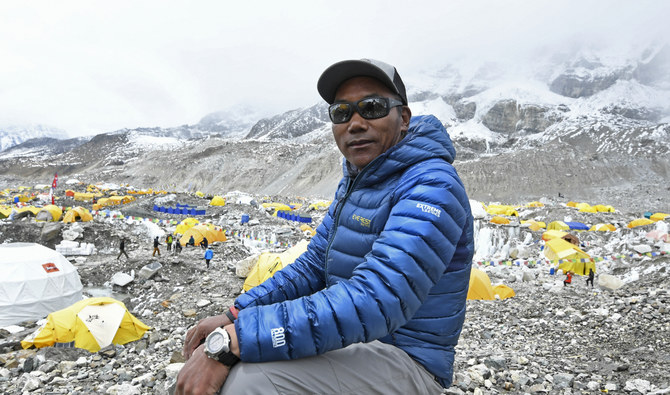
KATHMANDU: A 54-year-old Nepali climber known as “Everest Man” reached the peak of the world’s highest mountain for a record 30th time on Wednesday, three decades after his first summit.
Kami Rita Sherpa, who broke his own record after climbing the 8,849-meter peak for the 29th time earlier this month, has previously said that he was “just working” and did not plan on setting records.
“Kami Rita reached the summit this morning. Now he has made a new record with 30 summits of Everest,” Mingma Sherpa of Seven Summit Treks, his expedition organizer, told AFP.
But celebrations were overshadowed after a Romanian mountaineer was confirmed dead, and a British climber and Nepali guide were reported missing — the latest casualties highlighting the risks of the sport.
Sherpa first stood on the top of Mount Everest in 1994 when working for a commercial expedition.
Since then he has climbed Everest almost every year, guiding clients.
“I am glad for the record, but records are eventually broken,” he told AFP after his 29th climb on May 12.
“I am more happy that my climbs help Nepal be recognized in the world.”
Nepal has issued more than 900 permits for its mountains this year, including 419 for Everest, earning more than $5 million in royalties. Around 500 climbers and their guides have already reached the summit of Everest after a rope-fixing team reached the peak last month.
This year, China also reopened the Tibetan route to foreigners for the first time since closing it in 2020 because of the pandemic.
Nepal is home to eight of the world’s 10 highest peaks and welcomes hundreds of adventurers each spring, when temperatures are warm and winds typically calm.
Last year more than 600 climbers made it to the summit of Everest but it was also the deadliest season on the mountain, with 18 fatalities.
Zelensky says Ukraine needs system to defend against Russia’s guided bombs
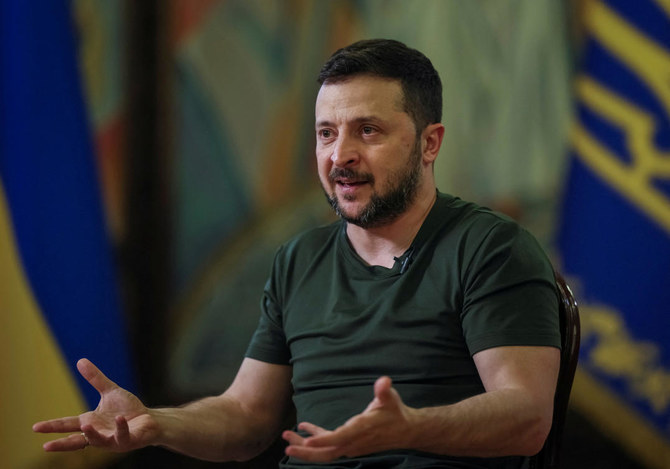
- Zelensky said Ukraine had made progress in developing electronic weaponry, “but in countering Russian bombs much remains to be done“
- “Ukraine needs systems and tactics that will allow us to protect our positions, our cities and our communities from these bombs“
KYIV: President Volodymyr Zelensky issued a fresh plea on Wednesday for upgraded defense systems to protect Ukraine’s cities against guided bombs, which he described as the “the main instrument” now used by Moscow in its attacks.
Zelensky has long called for improved air defenses as Russia intensifies its assaults on energy and other infrastructure. Russia says it does not deliberately target civilian sites, but thousands have been killed and injured since its February 2022 invasion of Ukraine.
Speaking in his nightly video address, Zelensky said Ukraine had made progress in developing electronic weaponry, “but in countering Russian bombs much remains to be done.”
“There can be no alternative. Ukraine needs systems and tactics that will allow us to protect our positions, our cities and our communities from these bombs,” he said.
“This is now practically the main instrument of Russian terror and in the occupiers’ advances.”
Earlier this month, Zelensky said Russia had used more than 3,200 guided bombs against Ukrainian targets throughout April, along with more than 300 missiles and about 300 Shahed-type drones.
Russia has increasingly resorted to these bombs, which are directed to a target by a guidance system, have great destructive potential and pose fewer risks to air crews delivering them.
In his comments, Zelensky said four more countries — Albania, Austria, Chile and Mozambique — had agreed to attend a “peace summit” in Switzerland in June with the aim of creating a broad front to oblige Russia to agree to a peace settlement under the terms of the UN Charter and acceptable to Kyiv.
“Russian aggression has tried to turn the UN Charter into a museum exhibit,” he said. “Our peace summit, the participation of global leaders, can restore the full effectiveness and full protection of the UN Charter to every nation.”
Zelensky’s peace plan calls for the withdrawal of all Russian forces and the restoration of Ukraine’s 1991 borders.
Russia, which rejects the plan, is not invited to the June meeting and dismisses as pointless any discussion of the conflict without its participation.
US says Palestinian state should come via talks, not unilateral recognition
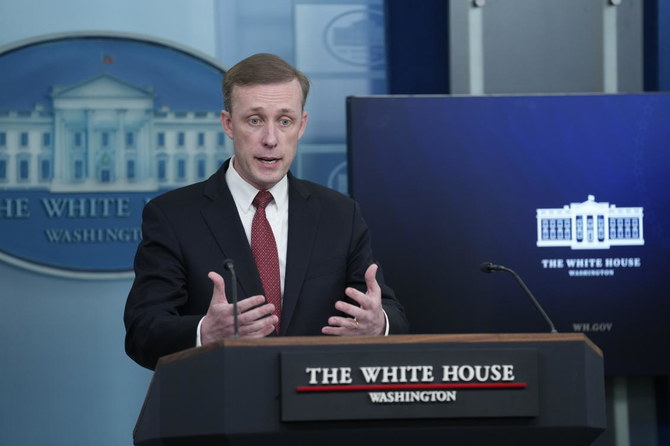
- Washington’s reaction appeared to signal US dismay that the three European nations announced an intent to proceed with unilateral recognition of a Palestinian state
- White House national security adviser Jake Sullivan told a regular news briefing each country could make its own decision on recognition of a Palestinian state
WASHINGTON: US President Joe Biden believes a Palestinian state should be achieved through negotiations, not unilateral recognition, the White House said on Wednesday after Ireland, Spain and Norway said they would recognize a Palestinian state this month.
Washington’s reaction appeared to signal US dismay that the three European nations announced an intent to proceed with unilateral recognition of a Palestinian state, which does not exist in practice.
White House national security adviser Jake Sullivan told a regular news briefing each country could make its own decision on recognition of a Palestinian state, but that Biden thinks direct negotiations by the parties is the best approach.
“President Biden believes that a two-state solution that guarantees Israel’s security and also a future of dignity and security for the Palestinian people is the best way to bring about long-term security and stability for everyone in the region,” Sullivan said.
“President Biden ... has been equally emphatic on the record that that two-state solution should be brought about through direct negotiations through the parties, not for unilateral recognition.”
Sullivan had been asked if the United States was concerned that other nations might follow suit in recognizing a Palestinian state. He said the US would communicate its consistent position to partners “see what unfolds.”
WAR IN GAZA
Decades of US efforts have failed to achieve a “two-state solution” with Israel living alongside a Palestinian state encompassing the West Bank, ruled by the Palestinian Authority (PA), and Gaza, ruled by the Hamas Islamist movement since it seized the coastal strip from the PA in a brief 2007 civil war.
Israel began an offensive in Gaza after Hamas-led gunmen attacked Israel on Oct. 7, killing 1,200 people and taking 253 hostages, according to Israeli figures.
More than 35,000 Palestinians have been killed in Gaza since then, health officials in the Hamas-run enclave say.
Israel is now attacking Rafah in southern Gaza, saying it wants to root out Hamas militants. Hundreds of thousands of Palestinians have fled Rafah since the start of the assault, and the main access routes for aid into Gaza have been blocked.
Sullivan said he was briefed on Israeli plans to minimize civilian harm in Rafah during a weekend visit to the region, and Washington will track whether the assault causes widespread death and destruction or is more precise and proportional.
“We now have to see what unfolds from here,” he said.
He said aid was flowing in from a pier in Gaza, and that it was wrong for Israel to withhold funds from the West Bank.
Court dismisses case against Egyptians accused in shipwreck that killed several migrants, including Pakistanis
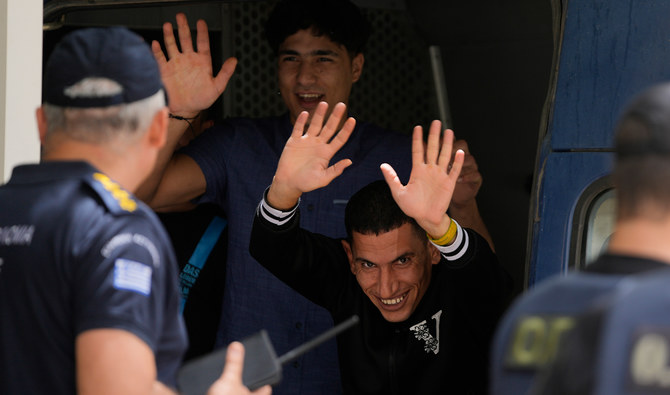
- Nine Egyptians were jailed for nearly a year on suspicion they were crew members of ship that sank last year
- Adriana, carrying hundreds of migrants from Pakistan, Egypt and Syria, sank off a Greek coast in June 2023
NAFPLIO, Greece: A group of Egyptians jailed for nearly a year pending trial for a deadly shipwreck were released from jail Wednesday, a day after a Greek court threw out the case against them on grounds that it had no jurisdiction to try it.
Nine Egyptians had been charged with being part of the crew of the Adriana, a massively overcrowded trawler that capsized and sank near Greece last June with an estimated 700 people on board while sailing from Libya to Italy. Only 104 people survived – all men, mostly from Syria, Egypt and Pakistan — and 82 bodies were recovered.
The nine, who have been in pre-trial custody since their rescue last year, had been charged with being members of a migrant smuggling ring and were accused of having caused the shipwreck. They had faced several life sentences if convicted.
But a court in the southern Greek city of Kalamata on Tuesday ruled it had no jurisdiction to try the case, as the shipwreck occurred in international waters, none of those involved had been trying to enter Greece, the ship was not Greek flagged and no Greek citizens were on board.
The Egyptians’ defense team had argued that the nine were not crew members of the ill-fated trawler but had been paying passengers who were mistakenly identified as crew by nine other survivors, and that they were being used as scapegoats by authorities eager to put all the blame for the tragedy on the trawler’s crew.
Eight of the nine were released from a jail outside the southern city of Nafplio on Wednesday evening. They were transferred to a police station in the city, where they were to remain in custody overnight pending further procedures. It was not immediately clear when they would be fully released from custody.
The ninth defendant was to be released from a different jail.
The massive loss of life in the sinking of the Adriana in the early hours of June 14, 2023, renewed pressure on European governments to protect the lives of migrants and asylum seekers trying to reach the continent. The European border protection agency Frontex says illegal border detections at EU frontiers increased for three consecutive years through 2023, reaching the highest level since the 2015-2016 migration crisis, driven largely by arrivals by sea.
The exact circumstances of how the Adriana sank remain unclear. The trawler was sailing in international waters but within Greece’s search and rescue area of operations, and a coast guard patrol boat and passing merchant ships were near the vessel for several hours. Greek authorities have said the trawler’s crew repeatedly refused offers of help, insisting it wanted to continue to Italy.
Several survivors have said the boat capsized after the Greek coast guard attempted to tow it, an accusation Greek authorities have vehemently denied. A Naval Court investigation into the sinking is still underway.
Speaking at the courthouse after the case was dismissed on Tuesday, Dimitris Choulis, one of the lawyers in the defense team for the nine Egyptians, said attention should turn to how the Adriana sank.
“The court today had to be very brave to issue this decision, and to say that these people are not the smugglers,” Choulis said.
The lawyer blamed the tragedy on the Greek coast guard and Europe’s migration policies, and said it was essential to “make sure that nothing like that would happen again.”


